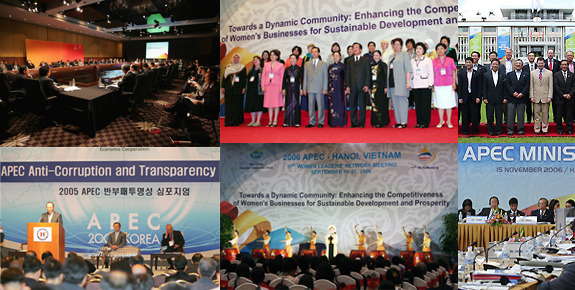News & Publications
Press Release
Heads of Asia-Pacific Anti-Corruption Agencies Get Together
- Date2009-08-25
- Hit961
The ACRC hosts the APEC Anti-Corruption & Transparency Symposium
and a meeting of the heads of anti-corruption agencies
Anti-corruption agency heads and high ranking officials in the Asia-Pacific region will gather in Seoul to discuss anti-corruption activities, and exchange information.
From September 16 through 17, the ACRC holds the 2009 APEC Anti-Corruption & Transparency Symposium in Seoul. This is the first and largest international symposium in Korea on the theme of building anti-corruption capacity that the Anti-Corruption and Civil Rights Commission (ACRC) has ever held.
The Symposium is expected to be a great opportunity to share information on various approaches to building anti-corruption capacity and to provide new insights into the wary for fighting corruption.
The symposium will bring together some 150 dignitaries from 21 APEC member economies and non-member countries including heads of foreign anti-corruption government bodies, experts from international organizations such as the UN and the World Bank, and professionals from academia and civil society.
Major participants will include: Chief Commissioner Datuk Seri Ahmad Said Hamdan of the Malaysian Anti-Corruption Commission; President Panthep Klanarongran of the National Anti-Corruption Commission in Thailand; Ombudsman of the Philippines Merceditas N. Gutierrez; General Council Don W. Fox of US Office of Government Ethics; Chairperson Dasho Neten Zangmo of the Anti-Corruption Commission in Bhutan; Vice Chairman Bibit Samad Rianto of the Corruption Eradication Commission in Indonesia; the Hon. Jerrold Cripps QC of New South Wales Independent Commission Against Corruption in Australia; and Deputy Inspector General Le Tien Hao of the Government Inspectorate in Vietnam.
Under the theme of "Systematic approach to building anti-corruption capacity," the symposium will be divided into three sessions: the 1st session on anti-corruption capacity building and the role of anti-corruption organizations; the 2nd session on diagnosis of corruption level and countermeasures to prevent corruption; and the 3rd session on best anti-corruption policies to build anti-corruption capacity. The symposium is expected to contribute to the systemization of anti-corruption capacity building projects as it is designed to discuss and share anti-corruption technical assistance experience with the APEC member economies.
Since Indonesia and Bhutan, which participated in anti-corruption technical cooperation projects along with Korea, are scheduled to present their own cases, the upcoming symposium will come as a great opportunity to see how Korean experience is introduced and applied to other countries.
Signing an MOU with the UNDP in 2007, the ACRC carried out anti-corruption training courses for Bhutanese and Bangladesh public officials and on-site consulting sessions in Bhutan in 2008. After signing an MOU with Indonesia in December 2006, the ACRC supported the Southeastern country to carry out Integrity Assessment and Assessment of Anti-Corruption Initiatives. The Indonesian Corruption Eradication Commission or Komisi Pemberantasan Korupsi (KPK) introduced and implemented Integrity Assessment in 2007.
As such cooperative anti-corruption project started to get known to the international community, Asia-Pacific countries have been steadily requesting that there be an occasion where Korea"s experience of anti-corruption assistance projects is systematically discussed and shared.
Under the circumstance, with a more than $100, 000-fund support from the APEC Secretariat, the ACRC holds the 2009 APEC Anti-Corruption & Transparency Symposium to share its anti-corruption technical assistance experience and member economies" anti-corruption best practices.
Meanwhile, the ACRC will hold the 5th Anti-Corruption Agency (ACA) Forum and the Korea-Indonesia Cooperation and Coordination Committee before and after the symposium, respectively.
The ACA Forum will take place on September 15 to strengthen cooperation among anti-corruption bodies in the Asia-Pacific region. The forum will be attended by some 30 anti-corruption agency heads and related persons from 10 countries including Australia, Hong Kong, Indonesia, Malaysia, and Korea. At the forum, "Seoul Statement" that elucidates mutual determination of anti-corruption leaders in the region to fight corruption and build anti-corruption capacity will be adopted, and a variety of measures to beef up the capacity and role of anti-corruption organizations will be discussed.
The members of the ACA Forum are 6 countries of Korea, Hong Kong, Singapore, Indonesia, Malaysia, and Australia. The first Forum was held in Seoul in November 2002. The ACRC, which currently serves as ACA Forum"s secretariat, plans to open an official ACA website in 2010 and utilize it as a venue to share best practices of member anti-corruption agencies and gradually develop it as an anti-corruption information hub in the Asia-Pacific region.
In addition, On September 15, the ACRC plans to sign an MOU on anti-corruption cooperation with the National Anti-Corruption Commission (NACC) in Thailand. This is a result of the request by the NACC, which showed an interest in adopting Korea"s excellent anti-corruption programs such as Integrity Assessment and Corruption Impact Assessment. This MOU is mainly about sharing bilateral anti-corruption policies and experience. Moreover, included in the MOU are the development of anti-corruption education programs and the promotion of the achievements of bilateral anti-corruption cooperation activities to the international community. The ACRC expects that signing an MOU with the NACC will serve to expand cooperation with Thailand, one of the major ASESA countries and home to the largest number of international organizations in Asia.
At the Korea-Indonesia Cooperation & Coordination Committee that will be held on September 18, the achievement in the implementation of the Korea-Indonesia Anti-Corruption MOU, which was mentioned as a successful project in the March Korea-Indonesia summit, will be evaluated and the direction of future cooperation projects from 2010 to 2012 will be discussed. Regarding the direction of future cooperation projects, there will be discussion on on-site consulting sessions on major anti-corruption institutions such as Corruption Impact Assessment and Assessment of Anti-Corruption Initiatives, and involvement of academia in the bilateral cooperation program.
�










